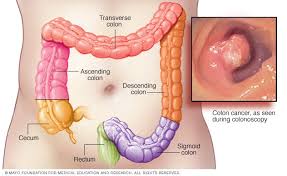Colon cancer, also known as colorectal cancer, is a type of cancer that begins in the large intestine (colon) or rectum. It is one of the most common cancers worldwide, but with early detection, it is often treatable. Recognizing the symptoms early can significantly improve outcomes, making it essential for individuals to be informed about the warning signs. In this article, we’ll explore the various symptoms of colon cancer, why they occur, and what you should do if you experience any of these signs.
1. Understanding Colon Cancer and Its Stages
Colon cancer develops when cells in the colon or rectum begin to grow abnormally and uncontrollably. These abnormal cells can form polyps, which are growths on the inner wall of the colon. Some polyps can develop into cancer over time if not detected and removed. Colon cancer typically progresses in stages:
- Stage 0: Cancer is only in the innermost layer of the colon or rectum.
- Stage I: Cancer has spread to the next layers of tissue but not beyond the colon or rectum.
- Stage II: Cancer has grown through the colon or rectal wall but hasn’t reached the lymph nodes.
- Stage III: Cancer has spread to lymph nodes but not to distant organs.
- Stage IV: Cancer has spread to other organs in the body, such as the liver or lungs.
The symptoms of colon cancer can vary based on its stage and the tumor’s location. Early-stage colon cancer may have subtle or no symptoms, which is why screening is so important.
2. Common Symptoms of Colon Cancer
a) Changes in Bowel Habits
One of the first signs of colon cancer is often a noticeable change in bowel habits. You may experience:
- Persistent Diarrhea or Constipation: Diarrhea that doesn’t improve with over-the-counter treatments or chronic constipation could indicate a blockage in the colon caused by a tumor.
- Narrow or Thin Stools: If the diameter of your stools becomes consistently narrow, it might suggest that a tumor is partially obstructing your colon.
- Inconsistent Bowel Movements: Alternating between constipation and diarrhea can be a sign of colon cancer, especially if this pattern persists over time.
These changes happen because a tumor in the colon can interfere with the normal passage of stool.
b) Rectal Bleeding or Blood in Stool
Blood in the stool is a common and alarming symptom of colon cancer. Blood may appear:
- Bright Red or Maroon-Colored: This can indicate that the bleeding is occurring lower in the colon or rectum.
- Dark or Black Stools: Stools that appear dark or tar-like can indicate bleeding higher up in the colon.
While blood in the stool could also be caused by conditions like hemorrhoids or anal fissures, it’s essential to have it evaluated by a healthcare provider to rule out colon cancer.
c) Abdominal Pain and Discomfort
Persistent or unexplained abdominal pain can be an early symptom of colon cancer. This pain may present as:
- Cramping or Bloating: A sensation of fullness, bloating, or cramping is common when there is a blockage in the colon.
- Gas Pain: Some patients experience frequent gas pain or a feeling of pressure in the abdomen.
- Persistent Pain: If the pain is continuous or associated with other symptoms like bloating, it could indicate a tumor obstructing the colon.
These symptoms arise as the tumor grows and interferes with the normal functioning of the digestive tract.
3. Unexplained Weight Loss
Unintended weight loss can be a significant warning sign of colon cancer. If you are losing weight without making any changes to your diet or exercise routine, it’s essential to take it seriously. This weight loss occurs because cancer cells use up more energy, and the body’s immune response to cancer can also increase calorie expenditure. Additionally, as the tumor grows, it can interfere with the body’s ability to absorb nutrients, further contributing to weight loss.
4. Fatigue and Weakness
Chronic fatigue and weakness are common in people with colon cancer, even in the early stages. This can happen due to:
- Blood Loss: Ongoing bleeding in the colon can lead to anemia, which reduces the number of red blood cells available to carry oxygen. Low oxygen levels result in fatigue and weakness.
- Immune System Response: The body’s immune system fights the cancer, which can drain your energy and cause feelings of extreme tiredness.
If you find yourself feeling constantly tired or weak without any clear cause, it’s a good idea to consult a doctor for further evaluation.
5. Anemia and Pale Skin
Anemia can be another symptom of colon cancer, particularly if it is accompanied by rectal bleeding. Anemia occurs when there aren’t enough red blood cells to carry oxygen around the body. If colon cancer causes blood loss over time, it can lead to iron-deficiency anemia, which might manifest as:
- Pale Skin: A lack of healthy red blood cells can lead to pallor, especially in the face, nails, and the inside of the lower eyelids.
- Shortness of Breath: With fewer red blood cells to carry oxygen, the body must work harder, and you may feel breathless or winded easily.
- Dizziness: Anemia can make you feel dizzy or lightheaded due to low oxygen levels.
6. Feeling Like You Can’t Empty Your Bowels Completely
If you have a persistent feeling that you need to have a bowel movement even after you’ve gone to the bathroom, this could be a sign of colon cancer. Known as tenesmus, this feeling occurs when a tumor in the rectum or colon makes you feel that your bowels aren’t fully emptied. This can also lead to a sense of urgency or a need to use the restroom frequently.
7. Nausea and Vomiting
As colon cancer progresses, it can cause blockages in the digestive tract. This may result in:
- Nausea and Vomiting: When the passage of food or waste is restricted, it can cause food to back up, leading to nausea and sometimes vomiting.
- Severe Abdominal Pain: If there is a significant blockage, the discomfort may be intense and could worsen after eating.
While nausea and vomiting can be caused by many other conditions, they should be evaluated if they persist, especially in combination with other symptoms of colon cancer.
When to See a Doctor
If you notice any of these symptoms, especially if they persist for more than a few weeks, it’s essential to consult a healthcare provider. Many symptoms of colon cancer can overlap with less serious conditions like irritable bowel syndrome (IBS) or hemorrhoids, but it’s always best to err on the side of caution.
For individuals over 50, regular colon cancer screenings are recommended as part of routine healthcare. However, younger people with a family history of colon cancer or other risk factors, such as inflammatory bowel disease or a history of polyps, should consider starting screenings earlier.
Conclusion
Colon cancer can be a silent disease, but paying attention to your body and recognizing these symptoms can help detect it early. Early diagnosis is key to effective treatment, and in many cases, can lead to a complete cure. Remember, while these symptoms can indicate colon cancer, they can also result from other, less serious conditions. The most important step is to consult a healthcare professional who can provide a definitive diagnosis through screenings and tests.


